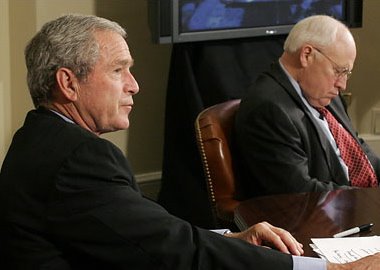One thing I have always wanted to see reported is, what happens to all those campaign contributions?
I'm always flummoxed when a candidate can raise $2M in one night to get into office so they can fight a bill that spends $500,000. Seems like if you can just throw a dinner and raise that kind of money, then we shouldn't really have money problems in our government, should we? Why can't we throw a dinner for Medicaid?
I suppose that the donors consider it money well spent if they only have to pay it once rather than face a permanent tax. Or perhaps it's because, on principle, government forces you to spend your money via tax dollars on whatever they want, but at least with a candidate you have your choice of where to put your $2K.
During an election cycle (when are we not in an election cycle?) we hear a lot about the funds being raised in the millions of dollars, and the cost of running a campaign, which is vast, mostly because of TV ads. (Which is why you won't hear this story on CNN.)
What I've always wondered is, what happens to our economy when millions, perhaps billions when it's all added together, gets sucked out and siphoned into campaigns? If there is all this discretionary income lying around in American pocketbooks, what happens when it gets taken out of regular circulation (from your vacation money, your home improvement projects, your trips to the mall) and funneled into a campaign? Does this hurt the economy in general, or is the money from a campaign "trickling down" (as they say) back into the economy?
For instance, is it possible that election-cycles every 2 years are the thing that keeps printers of yard signs and posters, makers of buttons, bumper-sticker companies, tee-shirt companies, caterers, event halls, and for-hire telemarketing banks afloat? Is it possible that certain sectors of the economy get a shot in the arm each time, similar to the yearly Christmas-season retail boom, that keep them in business?
We all know that most of the money raised for a candidate goes to TV ads. TV ads are extraordinarily expensive, and there is no discount for "the good of the country". Personally, here's where I think there should be some real reform. Cut those costs. Force TV networks to adhere to a pre-approved pay schedule for political ads sponsored by the candidate's campaign (not the 527s) and watch the costs of a campaign drop significantly. This I believe would promote more honest campaigns, more honest politicians, and allow more room for the proverbial "little guy" to run. But I digress.
Back to those TV ads, and more specifically, those TV networks who are raking in the big bucks. I'm no economist, so I don't know what this means. It might mean that the networks are able to produce their content, making TV "free", or at least affordable (it might be that many major TV networks would be crippled without this periodic influx of cash). Or maybe it's more "trickle-y" than that, maybe it goes to high salaries for management and returns for stockholders, so that they can then go on those vacations and do the home improvements that the rest of us had forgone to send in our campaign contributions. (Hey, wait a minute...)
But Walter Shapiro at Salon.com is reporting that whatever the answers to these questions, a disgustingly enormous amount of money, and a serious percentage of campaign dollars, is going to media consultants.
For more than a quarter-century, media consultants have been paid not in fixed dollar terms, but as a percentage of the campaign's television buy. The more often a candidate goes on television, the more the media consultant makes...We're not picking on Democrats here, although in the interests of modesty it's good to use your own party as an example. But there has been a movement afoot, and for this the author again uses a Democratic example, to negotiate contracts without these huge fees, thereby greatly reducing the cost of the campaign:
These days, in a typical hotly contested House race, the media consulting firm will get between 10 percent and 15 percent of the total television ad buy, full reimbursement of production costs, maybe a post-election "victory bonus" and sometimes a $3,000-a-month consulting fee. ...The consultant's percentage fee is calculated based on the TV stations' posted ad rates (the inflated gross) rather than the actual charges (the net)...
As outlined in Joe Klein's new book, "Politics Lost," Shrum and his firm ended up receiving between between 4.5 percent and roughly 6 percent of the money Kerry spent on TV ads from the end of the primaries until Election Day. While precise figures are unavailable, it is a conservative guess that Shrum and his partners made more than $6 million (plus reimbursement for production costs) from the effort to oust George W. Bush from the White House.
Do you know what it takes to raise $6 million in politics? Picture a political gala in the largest hotel ballroom in the country -- an event so crammed with tables that there is risk of a fire hazard, with everyone in the room giving the maximum legal contribution ($2,000 in 2004). Now imagine the outrage if everyone at that dinner had been told that their money was not going to elect John Kerry president, but to pay the fees of his media consulting firm.
In sharp contrast, the Democratic National Committee, which independently spent about $100 million on TV ads in 2004, insisted that its media firms work for a flat fee rather than a percentage of the ad buy...Unlike the Kerry campaign, the DNC paid a rock-bottom 1.7 percent of the TV buy for consulting services and ad placement...Leading figures in the party such as Sens. Hillary Clinton and Mark Warner have, with Kerman's assistance, championed flat-fee and reduced-fee arrangements with their consultants.Another interesting quote regards the FEC:
While the Federal Election Commission requires campaigns to laboriously detail every contribution of $200 or more, the government is far more cavalier about expenditures. The FEC acts as if the only possible corruption comes from the getting rather than the spending.But it seems to me that if we make some effort to control the costs of the campaign, by discounting TV ads or capping salaries of consultants or other means, then the candidates wouldn't be so desperate for contributions, and the corruption in "the getting" would naturally decrease.
This is a topic that I have always wanted to see reported, but that never is. Shapiro mentions this dilemma as well:
Given the reluctance of virtually everyone in politics to talk on-the-record about this taboo topic, I sometimes felt as if I would have to resort to meeting my sources in underground parking garages at 2 in morning.So I guess I have as many of my old questions answered as I'm going to get. But now I have a new one: What are we going to do about it?
UPDATE: Bob Shrum has published a book called "No Excuses: Concessions of a Serial Campaigner". I haven't read it but I've heard some interviews about it, and I haven't heard him explain or lament or rejoice in the vast sums he was paid.






No comments:
Post a Comment